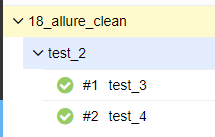1. 背景
- pytest 运行 测试用例生成 allure 报告时,当测试用例名称修改后重新运行,会保留历史运行记录
- 又或者分开运行两个测试用例文件,但是 allure 报告生成目录是同一个,那么 allure 报告会同时显示两个文件的测试用例运行情况
- 咱们来看看这种情况
2. 目录结构
下面两个栗子都是这个目录结构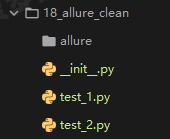
3. 指定测试用例文件名称的栗子
3.1 test_1.py 的代码
#!/usr/bin/env python# -*- coding: utf-8 -*-"""__title__ =__Time__ = 2020/10/28 11:03__Author__ = 小菠萝测试笔记__Blog__ = https://www.cnblogs.com/poloyy/"""def test_1():print("test_1 文件的测试用例1")def test_2():print("test_1 文件的测试用例2")
3.2 运行命令
进入该目录下,cmd 运行
pytest test_1.py --alluredir=./allure
3.3 allure 报告
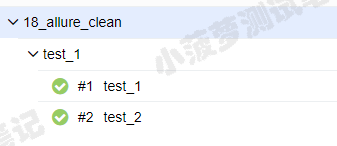
只有两条用例
3.4 修改一下 test_1.py 的代码```
def test_11():print("test_1 文件的测试用例1")def test_22():print("test_1 文件的测试用例2")
3.5 再次运行命令,查看 allure 报告
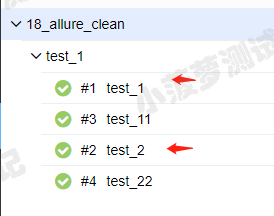
四条用例,包含了历史的两条,这不是我们希望看到的
4. 分开运行测试用例文件的栗子
4.1 test_2.py 的代码
#!/usr/bin/env python# -*- coding: utf-8 -*-"""__title__ =__Time__ = 2020/10/28 11:03__Author__ = 小菠萝测试笔记__Blog__ = https://www.cnblogs.com/poloyy/"""def test_1():print("test_1 文件的测试用例1")def test_2():print("test_1 文件的测试用例2")
4.2 分开运行 test_1 和 test_2 两个测试用例文件
# 先运行第一个pytest test_1.py --alluredir=./allure# 再运行第二个,此时应该希望 allure 报告只有 test_2.py 的测试用例pytest test_2.py --alluredir=./allure
4.3 查看 allure 报告
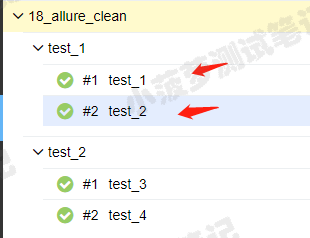
出现了 test_1.py 的测试用例,这不是想要的结果
5. —clean-alluredir 参数
5.1 前言
- pytest 提供了 —clean-alluredir 参数可以清空 allure 报告生成的目录
- 可以看看 pytest 的说明文档
pytest -h

5.2 将上面的栗子重新运行
# 先运行第一个pytest test_1.py --alluredir=./allure# 再运行第二个,此时应该希望 allure 报告只有 test_2.py 的测试用例pytest test_2.py --alluredir=./allure --clean-alluredir
5.3 运行结果
